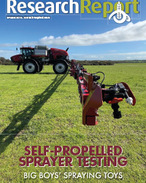This article is 8 years old. Images might not display.
It comes after a meeting between GPA’s Grains Policy Council, the Grains Research and Development Corporation, Australian Custom Harvesters and representatives of major insurance providers last week.
GPA president Andrew Weidemann said it was clear insurance was available for contractors and growers, regardless of whether they are harvesting cereals, oilseeds, pulses or any other grain crop.
“It’s a highly competitive space in respect of both premiums and product offerings and the clear message was that insurers are prepared to work with clients, or potential clients, to meet their needs,” Weidemann said.
“Header fires are an extremely serious issue for all involved, which in worst case scenarios can be many people far beyond the initial ignition point and is why all people working in harvest operations should know about and use all appropriate strategies to avoid or contain fires.
“In the event a fire does occur though, you want to know that insurance is there to help the recovery and all the insurers who met with us emphasised the long term nature of their businesses, which seek a balance over many years.
“It was recognised that last harvest produced enormous volumes of grain and in many areas went for an extended period, but the events of one season do not necessarily mean a change of direction for insurance.”
Kondinin Group engineer Ben White said harvester fire prevention was a topic that the group had worked on since the mid-2000s, after it was highlighted by contractors and farmers wanting more information to address the issues facing them at harvest.
“We have seen more vigilance, improved preparation and knowledge around harvester fires over the past decade, but there is a lot we don’t yet understand,” he said.
“Topics including minimising harvester risk and harvester fire suppression systems have been covered in Farming Ahead and in workshops in SA and Victoria.
“Farmers and contractors in particular have worked hard to improve operator understanding and adherence to guidelines to minimise risk whilst ensuring harvest is not held up as much as possible, so it is reassuring to hear insurers are aware of that effort and are willing to work with farmers and contractors to meet their needs.”























